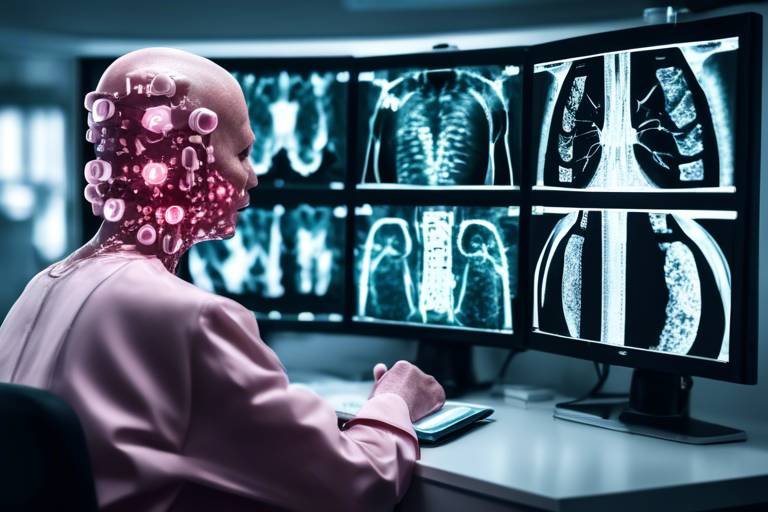The Influence of AI on Healthcare
Artificial Intelligence (AI) is no longer just a futuristic concept; it has firmly rooted itself in the fabric of the healthcare industry, acting as a catalyst for transformative changes. Imagine walking into a hospital where your medical history is analyzed in seconds, and treatment plans are customized just for you, all thanks to the power of AI. This technology is enhancing patient care, streamlining operations, and paving the way for innovative treatments and technologies that were once thought to be the stuff of science fiction.
At its core, AI in healthcare is about improving outcomes and making processes more efficient. It’s like having a highly skilled assistant who never tires, always learns, and is dedicated to providing the best possible care. From diagnostics to treatment plans, AI is reshaping how healthcare professionals interact with patients and manage their practices. As we dive deeper into this fascinating topic, let’s explore how AI is revolutionizing various aspects of healthcare.
One of the most significant impacts of AI is in the field of diagnostics. Traditional diagnostic methods can often be time-consuming and prone to human error. However, with AI technologies, we are witnessing a revolution in diagnostic processes that improves both accuracy and speed. Machine learning algorithms are adept at analyzing vast amounts of medical data, enabling healthcare providers to detect diseases at an earlier stage than ever before. This early detection is crucial as it often leads to better treatment outcomes and can even save lives.
For instance, AI can analyze medical imaging, such as X-rays and MRIs, identifying patterns that may be missed by the human eye. This not only speeds up the diagnostic process but also enhances the precision of results. As we look towards the future, the integration of AI in diagnostics promises to reduce the incidence of misdiagnoses, ensuring that patients receive the appropriate care when they need it the most.
Artificial intelligence is also making waves in the development of tailored treatment plans. By analyzing extensive datasets, AI can suggest optimal therapies based on individual patient profiles and historical outcomes. Imagine a scenario where your treatment is not just a one-size-fits-all approach but instead is uniquely crafted to fit your specific needs. This is the power of AI in creating personalized treatment plans that can significantly enhance therapeutic effectiveness.
One of the standout features of AI in treatment planning is predictive analytics. This technology utilizes AI to forecast patient outcomes and disease progression. It’s like having a crystal ball that allows healthcare providers to intervene earlier, which can drastically improve patient management and resource allocation. For example, hospitals can predict which patients are at risk of deteriorating based on their current health status and intervene proactively.
AI-driven risk assessment tools are invaluable in evaluating patient data to identify high-risk individuals. By prioritizing care for these patients, healthcare providers can implement preventive measures that enhance overall patient safety. It’s akin to having a safety net that catches those who are most vulnerable, ensuring they receive the attention they need before issues escalate.
Moreover, AI algorithms continuously analyze treatment efficacy, allowing for real-time adjustments to therapies. This ensures that patients receive the most effective interventions throughout their care journey. Think of it as a GPS for your health; if you take a wrong turn, it recalibrates and guides you back on track, ensuring you reach your destination safely and efficiently.
Another exciting aspect of AI in healthcare is its ability to facilitate personalized medicine. By analyzing genetic information, AI can help tailor treatments to individual genetic profiles, enhancing therapeutic effectiveness while minimizing adverse effects. This means that treatments can be specifically designed to work with your body’s unique makeup, increasing the likelihood of success and reducing the chances of negative side effects.
Aside from clinical applications, AI is also streamlining administrative processes in healthcare settings. By automating scheduling, billing, and patient records management, AI reduces the burden on staff, improving efficiency and allowing healthcare providers to focus more on patient care. Imagine a world where administrative tasks are handled seamlessly in the background, freeing up time for healthcare professionals to engage meaningfully with their patients.
Workflow automation powered by AI enhances operational efficiency by minimizing manual tasks. This leads to reduced errors and improved productivity, allowing healthcare professionals to devote more time to patient interaction. It’s like having a personal assistant that takes care of the mundane tasks, enabling doctors and nurses to focus on what truly matters—their patients.
AI simplifies data management by organizing and analyzing vast amounts of patient information. Effective data utilization leads to better decision-making and improved patient outcomes. In a world overflowing with data, AI acts as a beacon, guiding healthcare providers through the noise to find the insights that truly matter.
However, the integration of AI in healthcare does not come without its challenges. It raises important ethical questions that must be addressed to ensure responsible deployment. Issues such as data privacy, algorithmic bias, and the human touch in patient care are critical to consider as we move forward.
Protecting patient data is paramount in AI applications. Ensuring compliance with regulations and implementing robust security measures are essential to maintain patient trust and confidentiality. After all, trust is the foundation of the doctor-patient relationship, and any breach can have far-reaching consequences.
Additionally, AI systems can perpetuate existing biases if not carefully designed. Addressing algorithmic bias is vital to ensure equitable healthcare delivery and avoid disparities in treatment outcomes among different populations. It’s crucial that as we innovate, we also remain vigilant against biases that can undermine the very essence of healthcare—providing fair and equal treatment for all.
- What is AI in healthcare? AI in healthcare refers to the use of artificial intelligence technologies to improve patient care, streamline operations, and enhance diagnostics and treatment plans.
- How does AI improve diagnostics? AI improves diagnostics by analyzing medical data quickly and accurately, enabling earlier disease detection and reducing the risk of misdiagnosis.
- What are the ethical concerns surrounding AI in healthcare? Key ethical concerns include data privacy, algorithmic bias, and the need to maintain the human touch in patient care.
- Can AI personalize treatment plans? Yes, AI can analyze individual patient data to suggest personalized treatment plans that cater to specific health needs.

AI in Diagnostics
Artificial Intelligence (AI) is making significant strides in the realm of diagnostics, and the impact is nothing short of revolutionary. Imagine a world where diseases are detected earlier, more accurately, and with minimal human error. That’s the promise AI brings to healthcare diagnostics. By leveraging machine learning algorithms, healthcare professionals can now analyze vast amounts of medical data with unprecedented speed and precision. This technology doesn’t just enhance the accuracy of diagnoses; it also enables a level of personalization that was previously unattainable.
One of the standout features of AI in diagnostics is its ability to process complex datasets quickly. For instance, AI systems can sift through thousands of medical images, identifying patterns that the human eye might miss. This capability is particularly beneficial in fields like radiology, where early detection of conditions such as cancer can significantly improve patient outcomes. Furthermore, the integration of AI with electronic health records allows for a comprehensive analysis of a patient’s history, leading to more informed diagnostic decisions.
Moreover, AI's role in diagnostics is not limited to just identifying diseases; it also plays a crucial part in risk stratification. By evaluating patient data, AI can help clinicians identify individuals who are at a higher risk for certain conditions. This proactive approach not only facilitates earlier interventions but also enhances the overall efficiency of healthcare systems. For example, when a patient presents with specific symptoms, AI can analyze their medical history and suggest a list of potential diagnoses, allowing doctors to focus on the most likely conditions first.
To illustrate how AI is transforming diagnostics, consider the following table showcasing some key applications:
| AI Application | Description | Benefits |
|---|---|---|
| Image Analysis | AI algorithms analyze medical images for early disease detection. | Increased accuracy and speed in identifying conditions. |
| Predictive Analytics | AI forecasts disease progression based on patient data. | Allows for timely interventions and better management. |
| Natural Language Processing | AI interprets clinical notes and reports to extract relevant information. | Improves data utilization and decision-making. |
As we dive deeper into the world of AI in diagnostics, it becomes clear that the future of healthcare is bright. The ability to harness data effectively not only empowers healthcare providers but also enhances the patient experience. With faster diagnoses and tailored treatment plans, patients can expect better outcomes and a more focused approach to their healthcare needs. However, while the potential benefits are immense, it’s essential to remain vigilant about the ethical implications and ensure that AI technologies are used responsibly.
- How does AI improve diagnostic accuracy? AI improves diagnostic accuracy by analyzing large datasets and identifying patterns that may not be visible to human practitioners.
- What are the risks associated with AI in diagnostics? Risks include algorithmic bias, data privacy concerns, and the potential for over-reliance on technology.
- Can AI replace human doctors in diagnostics? While AI can enhance diagnostic processes, it is designed to assist healthcare professionals rather than replace them.

AI in Treatment Plans
Artificial intelligence is not just a buzzword in the healthcare landscape; it's a powerful tool that is reshaping how treatment plans are developed. Imagine having a personal health assistant that can sift through mountains of data in seconds, identifying the best possible therapies tailored specifically for you. That’s the magic of AI! By analyzing vast datasets, AI can suggest optimal therapies based on individual patient profiles and historical outcomes. This means that instead of a one-size-fits-all approach, treatments can be customized to fit the unique needs of each patient.
One of the most exciting aspects of AI in treatment planning is its ability to integrate information from various sources. For instance, AI can pull data from electronic health records, genetic information, and even lifestyle choices. When these elements are combined, healthcare professionals can create a comprehensive view of a patient’s health, leading to more informed decisions. This holistic approach not only enhances treatment effectiveness but also fosters a deeper patient-provider relationship.
Moreover, AI doesn't just stop at suggesting treatments. It actively monitors patient responses to therapies, adjusting plans in real-time to ensure optimal outcomes. Think of it as a dynamic GPS for your health journey—constantly recalibrating based on your progress. For example, if a particular medication is not yielding the desired results, AI can quickly analyze alternative options, taking into account the patient's specific genetic makeup and previous treatment responses. This level of adaptability is a game changer in the world of medicine.
To illustrate how AI is transforming treatment plans, consider the following table that outlines some key benefits:
| Benefit | Description |
|---|---|
| Personalization | AI analyzes individual patient data to create tailored treatment plans. |
| Real-time Adjustments | AI continuously monitors treatment efficacy and adapts therapies as needed. |
| Data Integration | Combines information from various sources for a comprehensive health overview. |
| Improved Outcomes | Personalized and adaptive treatment plans lead to better patient outcomes. |
Furthermore, the role of predictive analytics cannot be overlooked in this context. By utilizing AI, healthcare providers can forecast how patients might respond to different treatments, allowing for proactive adjustments before issues arise. This predictive capability not only enhances the quality of care but also optimizes resource allocation within healthcare systems.
In summary, AI is revolutionizing treatment plans by offering a level of personalization and adaptability that was previously unattainable. It empowers healthcare professionals to make informed decisions that cater specifically to the needs of individual patients. As AI technology continues to evolve, we can expect even more innovative solutions that will further enhance patient care and outcomes.
- What is AI's role in developing treatment plans? AI analyzes extensive patient data to create personalized treatment strategies that are more effective than traditional methods.
- Can AI adjust treatment plans in real-time? Yes, AI continuously monitors patient responses and can make real-time adjustments to therapies as needed.
- How does AI improve patient outcomes? By tailoring treatments to individual needs and predicting responses, AI enhances the effectiveness of care and minimizes adverse effects.

Predictive Analytics
Predictive analytics is a game-changer in the healthcare landscape, leveraging the power of artificial intelligence to forecast patient outcomes and disease progression. Imagine having a crystal ball that helps healthcare providers see potential health issues before they manifest. This proactive approach is not just a dream; it’s becoming a reality thanks to advanced algorithms that sift through mountains of data. By analyzing historical patient information, treatment responses, and even lifestyle factors, AI can identify patterns that might escape human observation.
For instance, consider a patient with a history of heart disease. Through predictive analytics, healthcare professionals can assess various data points—such as the patient's age, weight, family history, and even genetic markers—to predict their likelihood of experiencing a heart attack. This allows for timely interventions, such as lifestyle changes or medication adjustments, significantly improving patient outcomes.
Moreover, predictive analytics enhances resource allocation within healthcare systems. By identifying which patients are at higher risk for complications, hospitals can prioritize care and allocate resources more effectively. This not only ensures that those who need immediate attention receive it but also optimizes the overall efficiency of healthcare delivery.
To illustrate the impact of predictive analytics, consider the following table that summarizes the benefits:
| Benefit | Description |
|---|---|
| Early Intervention | Allows healthcare providers to act before a condition worsens, improving outcomes. |
| Resource Optimization | Helps in prioritizing care for high-risk patients, ensuring efficient use of resources. |
| Personalized Care | Enables tailored treatment plans based on predicted outcomes, enhancing patient satisfaction. |
In addition to these benefits, predictive analytics can also streamline clinical trials. By identifying suitable candidates based on predictive models, researchers can enhance the speed and efficiency of drug development. This means that innovative treatments can reach the market faster, ultimately benefiting patients who are in dire need of new therapies.
However, while the potential of predictive analytics is enormous, it’s essential to consider the ethical implications. Ensuring that the data used is accurate, up to date, and free from bias is crucial. After all, the goal is to provide equitable healthcare for all, not to exacerbate existing disparities. The integration of predictive analytics into healthcare must be approached with caution, ensuring that it complements the human touch that is so vital in patient care.
- What is predictive analytics in healthcare?
Predictive analytics uses AI and data analysis to forecast patient outcomes and disease progression, allowing for proactive interventions. - How does predictive analytics improve patient care?
By identifying high-risk patients and enabling early intervention, predictive analytics enhances overall patient management and outcomes. - Are there any risks associated with predictive analytics?
Yes, potential risks include data privacy concerns and algorithmic bias, which must be addressed to ensure equitable healthcare delivery.

Risk Assessment
In the dynamic landscape of healthcare, powered by artificial intelligence is becoming increasingly vital. Imagine a world where healthcare providers can predict potential health issues before they even manifest. This is not just a fantasy; it's the reality that AI is helping to create. By analyzing vast amounts of patient data, AI-driven tools can identify individuals who are at high risk for certain conditions, allowing for timely interventions that could save lives.
These advanced algorithms sift through various data points, including medical history, lifestyle choices, and even genetic information. The result? A comprehensive risk profile for each patient that enables healthcare professionals to prioritize care effectively. For instance, if a patient has a family history of heart disease, AI can flag them as high-risk and suggest preventive measures or closer monitoring. This personalized approach not only enhances patient safety but also optimizes resource allocation within healthcare systems.
Furthermore, the integration of AI in risk assessment processes can lead to better patient outcomes. By identifying risk factors early, healthcare providers can implement preventive strategies tailored to individual patients. This proactive stance is akin to having a safety net that catches potential issues before they escalate. For example, if a risk assessment tool identifies a patient at risk of developing diabetes, the healthcare team can initiate lifestyle changes and regular screenings, essentially turning back the clock on potential health deterioration.
However, it's essential to recognize that while AI enhances risk assessment, it is not infallible. The accuracy of these tools depends on the quality of the data fed into them. If the data is biased or incomplete, the risk predictions may not be reliable. Therefore, continuous monitoring and refinement of AI algorithms are crucial to ensure that they provide equitable and accurate assessments across diverse populations.
In summary, AI-driven risk assessment tools are transforming how healthcare providers identify and manage high-risk patients. By leveraging advanced analytics, these tools not only improve patient safety but also pave the way for more effective healthcare delivery. As we continue to embrace this technology, the goal remains clear: to create a healthcare system that is proactive rather than reactive, ensuring that every patient receives the best possible care tailored to their unique needs.
- What is the role of AI in risk assessment?
AI plays a crucial role in analyzing patient data to identify individuals at high risk for specific health conditions, enabling early intervention and personalized care. - How does AI improve patient safety?
By predicting potential health issues before they arise, AI allows healthcare providers to implement preventive measures, ultimately enhancing patient safety. - Are there any risks associated with AI in healthcare?
Yes, the accuracy of AI tools depends on the quality of data. If the data is biased or incomplete, it can lead to unreliable risk predictions. - Can AI replace healthcare professionals in risk assessment?
No, AI is a tool that enhances the capabilities of healthcare professionals but cannot replace the human touch and judgment required in patient care.

Treatment Optimization
is a game-changer in the healthcare landscape, driven by the power of artificial intelligence. Imagine a world where your healthcare provider can adjust your treatment in real-time, tailoring it to your unique needs based on the latest data. That’s precisely what AI algorithms are doing today. They continuously analyze the effectiveness of treatments, allowing for immediate adjustments that can lead to better outcomes for patients. This dynamic approach ensures that individuals receive the most effective interventions throughout their care journey.
Consider this: traditional treatment plans often rely on a one-size-fits-all methodology, which can lead to inefficiencies and suboptimal results. With AI, healthcare professionals can shift from this outdated model to a more personalized strategy. By analyzing a multitude of factors, including patient history, genetic information, and even lifestyle choices, AI systems can suggest modifications to treatment plans that are specifically designed for each patient. This not only enhances the effectiveness of the treatment but also minimizes potential side effects, making the entire process smoother and more efficient.
The real magic of treatment optimization lies in its ability to learn and adapt. For instance, if a patient is undergoing chemotherapy, AI can track their response to the treatment through various metrics such as blood tests, symptom diaries, and even wearable technology. If the data indicates that the current treatment isn’t yielding the desired results, AI can recommend alternative therapies or adjustments to dosages. This proactive approach can significantly improve patient outcomes, as interventions can be made before a patient experiences severe side effects or complications.
To illustrate the impact of treatment optimization, consider the following table that outlines the differences between traditional treatment methods and AI-driven approaches:
| Aspect | Traditional Treatment | AI-Driven Treatment Optimization |
|---|---|---|
| Flexibility | Static treatment plans | Dynamic adjustments based on real-time data |
| Patient Monitoring | Periodic check-ups | Continuous monitoring through AI algorithms |
| Outcome Prediction | Historical data analysis | Predictive analytics for future outcomes |
| Side Effects Management | Reactive management | Proactive adjustments to minimize side effects |
In conclusion, treatment optimization through AI is not just a trend; it's a transformative approach that is reshaping how we think about patient care. By harnessing the power of data and advanced algorithms, healthcare providers can ensure that treatments are not only effective but also tailored to the unique needs of each individual. As we continue to embrace these innovations, the future of healthcare looks brighter than ever, promising improved outcomes and a more personalized experience for all patients.
- What is treatment optimization? Treatment optimization involves using AI to adjust and personalize treatment plans based on real-time data and patient responses.
- How does AI improve treatment outcomes? AI analyzes vast amounts of patient data to suggest timely adjustments to treatments, ensuring they are effective and tailored to individual needs.
- Are there risks associated with AI in treatment planning? While AI offers many benefits, there are concerns regarding data privacy and algorithmic bias that need to be addressed to ensure fair and effective treatment.
- Can AI replace healthcare professionals? No, AI is designed to assist healthcare professionals by providing data-driven insights, allowing them to make more informed decisions.

Personalized Medicine
In the rapidly evolving landscape of healthcare, stands out as a beacon of innovation, driven largely by advancements in artificial intelligence (AI). Imagine a world where your treatment plan is as unique as your DNA—this is not just a dream, but a reality that AI is helping to create. By analyzing genetic information and other personal health data, AI enables healthcare providers to tailor treatments that are specifically designed for each individual. This approach not only enhances the effectiveness of therapies but also significantly reduces the risk of adverse effects.
Consider this: traditional medicine often adopts a one-size-fits-all strategy, which can lead to ineffective treatments for many patients. However, with AI's capability to sift through massive datasets, including genetic markers, lifestyle factors, and previous health outcomes, clinicians can now develop customized treatment plans. For example, a patient with a specific genetic mutation might respond better to a particular medication than others, and AI can pinpoint these nuances with astonishing accuracy.
Moreover, the integration of AI in personalized medicine fosters a deeper understanding of diseases at a molecular level. This not only aids in the identification of potential therapies but also opens the door to innovative treatments that were previously unimaginable. By utilizing AI algorithms, researchers can identify patterns in how different populations respond to various treatments, paving the way for precision medicine that considers not just the individual's genetics but also their environment and lifestyle.
To illustrate the impact of personalized medicine, let’s look at a few key benefits:
- Enhanced Treatment Efficacy: Personalized approaches ensure that patients receive the most effective treatments based on their unique characteristics.
- Reduced Side Effects: By tailoring medications to individual profiles, the likelihood of adverse reactions is minimized.
- Improved Patient Outcomes: With more precise treatments, patients often experience better health outcomes and quicker recoveries.
As we embrace the future, the role of AI in personalized medicine will only grow. The combination of AI's analytical power and the intricate data of human genetics is set to revolutionize how we approach healthcare. We are on the brink of a new era where healthcare becomes not just reactive but proactive, anticipating health issues before they arise and tailoring interventions to suit each patient’s unique needs.
Q: What is personalized medicine?
A: Personalized medicine is an approach to patient care that tailors treatment based on individual characteristics, including genetic makeup, lifestyle, and environment.
Q: How does AI contribute to personalized medicine?
A: AI analyzes large datasets, including genetic information, to identify the most effective treatments for individual patients, leading to better health outcomes and fewer side effects.
Q: Are there any risks associated with personalized medicine?
A: While personalized medicine offers many benefits, there are concerns regarding data privacy and the potential for algorithmic bias, which must be addressed to ensure equitable healthcare delivery.

AI in Administrative Tasks
Artificial Intelligence (AI) is making waves in the administrative side of healthcare, and the impact is nothing short of revolutionary. Imagine a world where healthcare professionals can spend less time buried in paperwork and more time engaging with patients. Sounds like a dream, right? Well, with AI, that dream is becoming a reality! By automating mundane tasks, AI not only enhances operational efficiency but also significantly reduces the burden on healthcare staff. This transformation allows them to focus on what truly matters: patient care.
One of the most significant ways AI is streamlining administrative processes is through the automation of scheduling and billing. Traditionally, these tasks could take hours, often leading to delays and frustration for both staff and patients. However, AI algorithms can now handle these processes with remarkable speed and accuracy. For example, AI-driven scheduling systems can analyze patient data and preferences to optimize appointment times, reducing no-shows and ensuring that healthcare facilities operate smoothly. This automation extends to billing as well, where AI can accurately process claims and manage patient accounts, significantly cutting down on human error.
Moreover, AI plays a crucial role in patient records management. Keeping track of patient information is vital for quality care, but it can be a daunting task. AI simplifies this by organizing and analyzing vast amounts of data quickly. With AI, healthcare providers can access patient histories at the click of a button, leading to better decision-making and improved patient outcomes. Imagine being able to pull up a patient’s entire medical history instantly during a consultation! This level of efficiency not only enhances the patient experience but also empowers healthcare professionals to provide more personalized care.
However, it’s essential to recognize that while AI is a powerful tool, it’s not infallible. The integration of AI into administrative tasks requires careful consideration and oversight. For instance, healthcare organizations must ensure that their AI systems comply with regulations regarding data privacy and security. Protecting sensitive patient information is paramount, and any breach could lead to a loss of trust and legal repercussions. Therefore, implementing robust security measures is crucial in maintaining patient confidentiality while leveraging AI technologies.
In conclusion, the influence of AI in administrative tasks is profound and far-reaching. It not only streamlines processes, enhancing efficiency and accuracy, but also allows healthcare professionals to dedicate more time to patient care. As we continue to embrace AI in healthcare, it’s vital to remain vigilant about ethical considerations and ensure that these technologies are used responsibly. The future of healthcare is bright, and with AI leading the charge, we can look forward to a more efficient and patient-centered approach to care.
- How does AI improve scheduling in healthcare? AI analyzes patient data to optimize appointment times, reducing wait times and improving the overall patient experience.
- What are the benefits of AI in billing? AI automates billing processes, minimizing human error and speeding up claim processing, which leads to more efficient revenue cycles.
- How does AI manage patient records? AI organizes and analyzes vast amounts of patient information, allowing for quick access to medical histories and enhancing decision-making.
- What security measures are needed for AI in healthcare? Organizations must implement robust security protocols to protect patient data and ensure compliance with privacy regulations.

Workflow Automation
In today's fast-paced healthcare environment, has emerged as a game-changer, transforming how healthcare professionals manage their daily tasks. Imagine a world where routine administrative duties are handled seamlessly, allowing doctors and nurses to focus on what truly matters: patient care. With the integration of artificial intelligence, this vision is becoming a reality. By automating repetitive tasks, healthcare providers can significantly reduce the time spent on paperwork and administrative duties, leading to enhanced operational efficiency.
One of the most significant benefits of workflow automation is its ability to minimize human errors. When tasks such as scheduling appointments, processing billing information, and managing patient records are automated, the chances of making mistakes decrease dramatically. This not only improves the accuracy of data but also fosters a more reliable healthcare environment. For instance, consider the traditional method of scheduling appointments manually. This process is prone to errors, such as double bookings or miscommunication. However, with AI-driven systems, these issues can be virtually eliminated, ensuring that patients receive timely care without the hassle of scheduling conflicts.
Furthermore, workflow automation enhances productivity. Healthcare professionals often find themselves overwhelmed with administrative responsibilities, which can detract from their ability to provide quality care. By implementing automated systems, healthcare facilities can streamline operations, allowing staff to devote more time to patient interaction and clinical responsibilities. For example, a study revealed that hospitals that adopted workflow automation saw a 20% increase in staff productivity, translating into more time spent with patients and improved overall satisfaction.
Additionally, the data generated through automated workflows can be invaluable. AI systems can analyze this data to identify trends, monitor performance, and optimize processes. Healthcare facilities can use these insights to make informed decisions that enhance patient care and operational efficiency. For instance, if an automated system highlights that certain types of appointments frequently result in cancellations, healthcare providers can adjust their scheduling practices accordingly, ultimately leading to better patient management.
To illustrate the impact of workflow automation, consider the following table that outlines the key areas of improvement in healthcare settings:
| Area of Improvement | Before Automation | After Automation |
|---|---|---|
| Appointment Scheduling | Manual entry, prone to errors | Automated, accurate scheduling |
| Billing Processes | Time-consuming, high error rate | Streamlined, reduced errors |
| Data Management | Fragmented, inefficient | Centralized, easily accessible |
| Patient Interaction | Limited time with patients | Increased focus on patient care |
In conclusion, workflow automation is not just a technological advancement; it's a vital step towards revolutionizing healthcare. By embracing AI-driven solutions, healthcare providers can enhance efficiency, reduce errors, and ultimately improve patient outcomes. As we continue to explore the possibilities of artificial intelligence in healthcare, it becomes increasingly clear that the future holds immense potential for both providers and patients alike.
- What is workflow automation in healthcare?
Workflow automation in healthcare refers to the use of technology and artificial intelligence to streamline and automate repetitive administrative tasks, allowing healthcare professionals to focus more on patient care. - How does workflow automation improve efficiency?
By automating routine tasks, workflow automation reduces the time spent on administrative duties, minimizes human errors, and allows healthcare staff to dedicate more time to patient interactions. - Can workflow automation impact patient care?
Yes, by enhancing operational efficiency and reducing administrative burdens, workflow automation can lead to improved patient care and satisfaction. - What are some examples of tasks that can be automated?
Tasks such as appointment scheduling, billing, patient record management, and data analysis can all be automated to improve efficiency in healthcare settings.

Data Management
In today's fast-paced healthcare environment, has become a pivotal aspect of delivering quality patient care. With the explosion of health data generated from various sources—such as electronic health records (EHRs), wearable devices, and genetic testing—healthcare providers are tasked with organizing and analyzing this information to make informed decisions. Enter artificial intelligence (AI), a game changer in the realm of data management. AI algorithms can sift through mountains of data, identifying patterns and insights that would be nearly impossible for humans to detect.
One of the most remarkable features of AI in data management is its ability to enhance data accuracy. Traditional data entry methods are prone to human error, which can lead to misdiagnoses or inappropriate treatment plans. AI systems, on the other hand, can automate these processes, ensuring that the information entered into patient records is both accurate and up-to-date. This not only improves the quality of care but also fosters a more reliable healthcare system overall.
Furthermore, AI enhances the efficiency of data retrieval. Imagine a scenario where a healthcare provider needs to access a patient's medical history quickly. With AI-driven data management systems, clinicians can retrieve relevant information in seconds rather than sifting through piles of paperwork or navigating cumbersome electronic systems. This speed is crucial in emergency situations, where every second counts.
Moreover, AI can facilitate better decision-making through its advanced analytics capabilities. By analyzing vast datasets, AI can provide healthcare professionals with actionable insights, such as identifying potential health risks or suggesting preventative measures. For instance, AI can flag patients who may be at risk for certain conditions based on their medical history, lifestyle choices, and genetic predispositions. This proactive approach not only improves patient outcomes but also optimizes resource allocation within healthcare facilities.
To illustrate the impact of AI on data management, consider the following table that highlights key benefits:
| Benefit | Description |
|---|---|
| Improved Accuracy | Reduces human error in data entry and management. |
| Faster Retrieval | Enables quick access to patient information when needed. |
| Enhanced Decision-Making | Provides actionable insights for better patient care. |
| Resource Optimization | Helps allocate resources more effectively based on data analysis. |
As we continue to embrace the digital transformation in healthcare, the importance of effective data management cannot be overstated. AI not only simplifies the complexities of handling vast amounts of information but also empowers healthcare professionals to make better, data-driven decisions that ultimately lead to improved patient outcomes. In this age of information, leveraging AI for data management is not just an option; it’s a necessity.
- What is the role of AI in healthcare data management?
AI plays a crucial role in automating data entry, enhancing data accuracy, and providing actionable insights for better decision-making. - How does AI improve patient outcomes?
By analyzing data to identify health risks and suggesting preventive measures, AI allows healthcare providers to intervene earlier, leading to improved patient outcomes. - Is patient data safe with AI systems?
Yes, but it is essential to implement robust security measures and comply with regulations to protect patient privacy and maintain trust.

Ethical Considerations
The integration of artificial intelligence (AI) in healthcare is not just a technological advancement; it brings forth a myriad of ethical considerations that we must carefully navigate. As we embrace these innovations, we must ask ourselves: are we prioritizing patient welfare, or are we inadvertently compromising it? The ethical landscape is complex, and understanding it is crucial for the responsible deployment of AI in medical settings.
One of the foremost concerns is data privacy. With AI systems analyzing vast amounts of sensitive patient information, ensuring the protection of this data is paramount. Healthcare providers must comply with stringent regulations, such as the Health Insurance Portability and Accountability Act (HIPAA) in the United States, which mandates the safeguarding of patient information. Furthermore, implementing robust security measures, such as encryption and access controls, is essential to maintain patient trust and confidentiality. After all, if patients feel their data is at risk, they may hesitate to seek care or share vital information, ultimately affecting their health outcomes.
Another significant issue is algorithmic bias. AI systems are only as good as the data fed into them, and unfortunately, historical data can carry biases that result in unequal treatment outcomes. For instance, if an AI algorithm is trained predominantly on data from a specific demographic, it may not perform as effectively for individuals outside that group. This can lead to disparities in healthcare access and quality. Addressing algorithmic bias is vital to ensure that AI technologies promote equitable healthcare delivery, rather than exacerbate existing inequalities.
Moreover, the human touch in patient care is irreplaceable. While AI can enhance diagnostic accuracy and streamline operations, it cannot replicate the empathy and understanding that human healthcare providers offer. Patients often seek not just treatment, but also emotional support and connection. Striking a balance between leveraging AI for efficiency while maintaining the personal aspect of care is crucial. After all, healthcare is not just about numbers; it's about people.
In summary, as we delve deeper into the world of AI in healthcare, we must remain vigilant about these ethical considerations. Addressing data privacy, combating algorithmic bias, and preserving the human element in care are essential steps in ensuring that AI serves as a tool for good. By doing so, we can harness the full potential of AI while safeguarding the values that underpin compassionate healthcare.
- What are the main ethical concerns regarding AI in healthcare? The primary ethical concerns include data privacy, algorithmic bias, and the preservation of the human touch in patient care.
- How can healthcare providers ensure data privacy when using AI? Healthcare providers must comply with regulations such as HIPAA and implement strong security measures like encryption and access controls.
- What is algorithmic bias, and why is it important? Algorithmic bias occurs when AI systems produce biased outcomes due to the data they are trained on. It is crucial to address this to ensure equitable healthcare delivery.
- Can AI replace human healthcare providers? No, while AI can assist in diagnostics and treatment, it cannot replace the empathy and understanding that human providers offer.

Data Privacy
In today's digital landscape, where artificial intelligence (AI) is becoming an integral part of healthcare, has emerged as a paramount concern. The sensitive nature of patient information means that any breach could have dire consequences, not just for individuals, but for the healthcare system as a whole. With AI systems processing vast amounts of data, ensuring that this information is handled with the utmost care is critical. So, how do we safeguard patient privacy while harnessing the power of AI?
First and foremost, it's essential for healthcare providers to comply with regulations such as the Health Insurance Portability and Accountability Act (HIPAA) in the United States. These regulations set stringent standards for the protection of patient data, and adherence to them is non-negotiable. However, compliance alone is not enough. Organizations must implement robust security measures, such as encryption and access controls, to protect sensitive information from unauthorized access.
Moreover, healthcare institutions must adopt a culture of transparency regarding how patient data is collected, used, and shared. Patients should be informed about the AI technologies being employed in their care and how their data contributes to these systems. This transparency fosters trust and reassures patients that their privacy is being prioritized. In fact, a survey found that 70% of patients are more likely to share their health information if they believe their data will be protected.
To further enhance data privacy, healthcare organizations should also consider the following strategies:
- Regular Audits: Conducting periodic audits of data management practices can help identify vulnerabilities and ensure compliance with privacy regulations.
- Employee Training: Training staff on data privacy policies and best practices is crucial. Employees should understand the importance of safeguarding patient information and how to recognize potential threats.
- Data Minimization: Collecting only the necessary data for AI applications can reduce the risk of exposure. This principle of data minimization limits the amount of sensitive information at stake.
Ultimately, protecting patient data in the age of AI is a shared responsibility. By implementing stringent security measures, fostering transparency, and prioritizing patient education, healthcare providers can create a safer environment for the use of AI technologies. This not only enhances patient trust but also paves the way for more innovative and effective healthcare solutions.
- What are the main privacy concerns with AI in healthcare?
The primary concerns include unauthorized access to sensitive patient data, potential misuse of information, and lack of transparency in how data is utilized. - How can patients ensure their data is protected?
Patients can inquire about the data protection policies of their healthcare providers and ensure that they understand how their information will be used. - What regulations govern data privacy in healthcare?
In the U.S., HIPAA is the main regulation that establishes national standards for the protection of health information.

Algorithmic Bias
Algorithmic bias in healthcare is a significant concern that cannot be overlooked. As artificial intelligence systems become more integrated into healthcare practices, the potential for these algorithms to reflect and even amplify existing biases in data is alarming. Imagine a scenario where a diagnostic tool trained on a dataset predominantly featuring one demographic fails to accurately assess patients from diverse backgrounds. This could lead to misdiagnoses or inadequate treatment recommendations, ultimately compromising patient safety and care quality.
One of the core issues surrounding algorithmic bias stems from the data used to train these AI systems. If the data is not representative of the entire population, the algorithm may develop skewed perspectives, resulting in disparities in healthcare delivery. For instance, a study might show that a certain treatment is effective for a specific group, but if that group does not encompass a wide range of ethnicities, ages, and health conditions, the findings could be misleading when applied to a broader patient base.
Addressing algorithmic bias is not just about improving technology; it’s about ensuring equitable healthcare for all. Here are some key strategies to mitigate this issue:
- Diverse Data Collection: It is essential to gather data from various demographics to create a more inclusive dataset that reflects the diversity of the patient population.
- Regular Audits: Implementing routine evaluations of AI systems can help identify and rectify biases that may have developed over time.
- Inclusive Development Teams: Involving diverse teams in the development of AI algorithms can provide different perspectives and help identify potential biases in the design phase.
Moreover, healthcare providers must remain vigilant and continuously educate themselves about the implications of AI in their practice. Understanding the limitations of these tools is crucial. Just because an algorithm suggests a course of action does not mean it is infallible. The human touch in healthcare—empathy, understanding, and personal interaction—cannot be replaced by technology. It is vital for healthcare professionals to balance AI insights with their clinical judgment to ensure that patient care remains holistic and comprehensive.
In conclusion, while AI holds great promise for transforming healthcare, the risks associated with algorithmic bias must be addressed proactively. By prioritizing ethical considerations and fostering an inclusive approach to AI development, we can work towards a future where technology enhances healthcare equity rather than undermining it.
- What is algorithmic bias? Algorithmic bias refers to systematic and unfair discrimination that can occur when AI systems make decisions based on flawed or unrepresentative data.
- How does algorithmic bias affect healthcare? It can lead to unequal treatment recommendations and misdiagnoses, particularly for underrepresented groups, compromising the quality of care.
- What can be done to reduce algorithmic bias? Strategies include improving data diversity, conducting regular audits, and involving diverse teams in AI development.
Frequently Asked Questions
- How is AI improving diagnostics in healthcare?
AI is enhancing diagnostics by utilizing machine learning algorithms to analyze medical data with remarkable speed and accuracy. This technology enables earlier detection of diseases, which ultimately leads to more personalized treatment plans for patients. Imagine having a super-smart assistant that can quickly sift through mountains of data to find the tiniest clues about your health!
- What role does AI play in developing treatment plans?
Artificial intelligence assists healthcare professionals in crafting tailored treatment plans by examining vast datasets. By comparing individual patient profiles with historical outcomes, AI can suggest the most effective therapies. Think of it as having a personal trainer for your health, customizing workouts (or treatments) just for you!
- What is predictive analytics in healthcare?
Predictive analytics leverages AI to foresee patient outcomes and disease progression. This proactive strategy allows healthcare providers to intervene at earlier stages, improving patient management and resource allocation. It’s like having a crystal ball that helps doctors anticipate health issues before they become serious!
- How does AI assist in risk assessment?
AI-driven risk assessment tools analyze patient data to identify individuals who are at high risk for certain conditions. This capability allows healthcare providers to prioritize care and implement preventive measures, which significantly enhances patient safety. Imagine having a radar that alerts you to potential health risks before they hit!
- Can AI help with administrative tasks in healthcare?
Absolutely! AI streamlines administrative processes such as scheduling, billing, and managing patient records. By automating these tasks, healthcare providers can focus more on patient care rather than paperwork, leading to a more efficient healthcare system. It's like having a helpful office assistant who takes care of all the tedious stuff!
- What are the ethical considerations of using AI in healthcare?
The integration of AI in healthcare raises important ethical questions, including data privacy, algorithmic bias, and maintaining the human touch in patient care. Addressing these concerns is crucial to ensure responsible AI deployment and to protect patient trust. It’s a balancing act between innovation and ethics, much like walking a tightrope!
- How is patient data protected in AI applications?
Protecting patient data is of utmost importance in AI applications. Compliance with regulations and implementing robust security measures are essential to maintain trust and confidentiality. Think of it as having a high-tech vault that keeps your personal information safe from prying eyes!
- What is algorithmic bias in AI, and why is it a concern?
Algorithmic bias occurs when AI systems reflect or perpetuate existing biases found in the data they are trained on. This is a significant concern because it can lead to inequitable healthcare delivery and disparities in treatment outcomes among different populations. It's crucial to design AI systems carefully to ensure fairness and equality in healthcare.



















